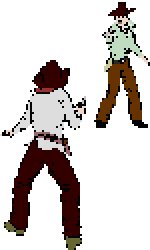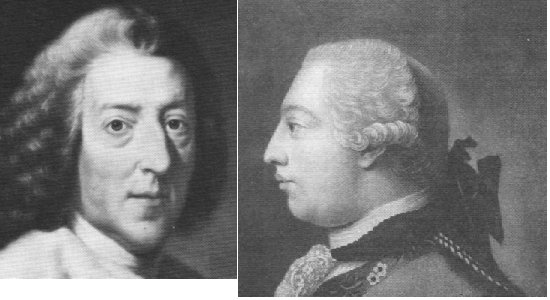
foreword | Historical Narratives | Resources | Links | Contact
JOHN WHITE
[b.circa 1761 - d.1800]
History is violently personal.
In a letter to John White's brother-in-law in England, Peter Russell informed him of White's death in a duel.
In His Own Words
"The wound was mortal from the first, the ball having entered on the right side and striking the spine dividing some of the bundles of nerves causing the most painful spasms. Though under the most excruciating torture, he retained his senses and understanding to within an hour of his death which occurred on the evening of the next day."
John White, a barrister, was the member of the first Legislative Assembly for the county of Leeds and Frontenac. Born in England White studied law at Gray's Inn and was called to the bar by in 1785. He was described as a man of "considerable practice, great respectability and character without reproach." White was recommended for the position of Attorney General of Upper Canada by William Osgoode, Chief Justice of Upper Canada, and was appointed to this position in 1791 at a salary of 300 pounds "with the possibility of some additional monies from other appointments." White settled with his wife and three children at Newark in September, 1792. The couple had been estranged and when the reconciliation proved unsuccessful Mrs. White returned to England in 1799.
In August 1792 during Simcoe's stopover in Kingston, he urged White to run for the Legislative Assembly which he did successfully. White's victory was due largely to Simcoe's presence in the area during the election campaign for the Governor strongly endorsed White's candidature. He made no secret of the fact that he wanted White elected and he cheerfully reported accomplishing this to his superior in London.
In His Own Words
"It was by great good fortune that the temporary residence I made at Kingston created sufficient influence to bring Attorney General White into the House."
Along with David William Smith, the surveyor-general, White promoted government-sponsored legislation in the Assembly. In 1793 White was largely responsible for piloting through the Assembly the Act which barred the further introduction of slaves into Upper Canada. This act eventually led to the abolition of slavery in Upper Canada. White was personally responsible also for the bill establishing the Court of King's Bench and district courts in 1794. White was not a member in the second Legislature, but he contested a bye-election in 1799 in the county of Addington and Ontario which he lost. A government spokesman said that in defeating White the voters revealed their "low ignorance in preferring an illiterate young man of their own level and neighbourhood." The government paid White's election expenses.
White was active in founding the Law Society of Upper Canada in 1797 and he served as its first president and treasurer. He alone among the Society's members supported the distinction between barrister and solicitor, but this disappeared after his death. As the first attorney general of the province, White was responsible for adapting English laws to the vastly different conditions of the colony. Land ownership problems were numerous as were difficulties getting convictions, particularly for murder. As the chief prosecutor, White complained that of the one or two people tried for murder in each district, "all were acquitted by the jury though the evidence was strongly against them." It appears jury members were reluctant to convict and condemn fellow citizens to the gallows. In the absence of jails, fines were levied but according to White they were rarely paid.
Squabbling and bickering frequently characterized the relationships of the ruling class in York, as its members sought to strengthen their positions in the hierarchy of the colony and secure important positions for their children. The degree of an individual's success depended on one's position, background and closeness to the Governor. A clique of high ranking officials in the colony included members of the Executive Council, judges, a few senior government officials, some lawyers and the senior officers at the garrison. Membership in this select group ensured financial security and important positions for one's children. Feelings of envy, jealousy and enmity often resulted in bitterness and resentments that were quick to develop and fester and sometimes led to tragedies.
White, who lived beyond his means, was often heavily in debt and always in search of more income. He competed with his colleagues for power and pelf, particularly for the lucrative fees on land patents. As his health deteriorated, he grew depressed, easily angered and rapidly became disillusioned with life in the colony. A friend noted, "The attorney is not very robust. His spirits seem to have left him. I fear he is not happy." Worse was to come for White.
White got into an argument with John Small, the clerk of the Executive Council, and Small insisted on immediate satisfaction on the field of honour. White unwisely agreed and seconds were chosen. Smalls' was Sheriff Alexander McDonell, while White's was a German officer named Baron de Hoen. The next day, January 2nd, 1800, White met Small in a field outside York. Shots were fired, White was seriously wounded and died thirty-six hours later. Mr. Small then surrendered himself to justice and was placed in custody charged with murder. Warrants were issued for the arrest of the seconds who turned themselves in. The trial took place on Monday, January 20th. and Small was acquitted. In trials resulting from duels the defendant invariably went free.
 |
|
|
Henry Allcock was the judge who presided over this, his most famous trial. He was a close friend of the deceased and openly expressed his unhappiness with the verdict. He charged that the Solicitor General had "failed altogether in adducing positive evidence of Small's guilt" He condemned the jury "for presuming nothing."
 |
|
|
The results of the trial were reported in the Upper Canada Gazette on January 25th, 1800. "On Monday last, 20th inst., the court of Oyer and Terminer (hearing and determining) for the town and county of York was opened, before which came John Small, esq., indicted for having mortally wounded the late attorney-general, John White, in a duel. After a trial of about eight hours he was acquitted." Because the Upper Canada Gazette was an official government newspaper, its report on John White's dueling death was brief and contained no editorializing. It did, however, include this eulogy: "The procession was solemn and pensive and shewed that though death, 'all eloquent' had seized upon him as its victim, yet it could not take from the public mind the lively sense of his virtues. Vivit post funera virtus." [Virtue survives death.]
The Constellation was a privately owned newspaper and it enjoyed a greater liberty of expression than the government paper. The Constellation's account included some remarks on the irrational practice of dueling in general and, in particular, on the sadness of the special case which had just occurred. "We have to lament the toleration and prevalence of a custom that is falsely deemed honourable or the criterion of true courage, a custom to gratify the passion of revenge in a single person by depriving both the country and a family of a person who was a real ornament of society and support, an outrage perpetrated on humanity that is too often procured by the meanly malicious." The editor mourned White's death as a great loss and eulogized him "as a professional gentleman, a sincere friend, an honest and upright man, a friend of the poor who had often refused to take fees for the duties he discharged and for advice he had given. He was a man highly esteemed. This is the man whom we have lost!"/pJohn White died heavily in debt. He was given a special grant of land equivalent to that of an executive councillor which went to his wife and children. Because Mrs. White had returned to England earlier, White's sons were cared for by Peter Russell who eventually "procured for them a Commodious and safe passage to England." White's estate was finally settled by a private member's bill in 1837.
Although White had a significant impact on the legal and judicial system of Upper Canada, his historic claim is not to fame but to the infamy arising largely from the manner of his death and the circumstances surrounding it. In 1871 labourers were digging for building purposes and came upon the grave of Attorney-General White. His remains were carefully removed and deposited in St. James Cemetery.
While this was the first duel fought in Toronto dueling was common at this time. The poor fought with fists and cudgels; the rich with pistols and swords. Dueling was a point of honour with nobility and it was difficult for a titled person to get through life without at least one puncture. Duelling derived from trial by combat and was based on the sociable assumption that the will of God would prevail. Monarchs tried to eliminate duelling as disruptive, particularly at court or in the armed services. The change from swords to pistols reduced the disadvantage for the novice being confronted by an expert.
Dueling had its supporters and its critics. Some looked upon it as an important code of honour. "This tie of society, serves to civilize mankind and great societies, which would soon degenerate into cruel villains and treacherous slaves were this honour removed from among them." Critics called it senseless madness. "Trifles light as air give rise to hostile meetings, the merest accident at a dance, a look, a jest, a few unconsidered words, a youthful chaff - these alone sufficient to force an unnatural thirst for blood."
Dueling was widespread in England and involved even the illustrious British statesman, Prime Minister William Pitt, who fought a duel over the comments of a member of the opposition. The pair exchanged shots with no ill effects, with Pitt discharging his second pistol into the air. King George III, later chastised Pitt for his rashness.
In His Own Words
"Public characters have no right to weigh alone what they owe themselves, but must consider what is due to their country."
 |
|
William Pitt & George III |
The American statesman Benjamin Franklin called it "a murderous practice. How can such miserable worms as we are entertain such pride as to suppose that every offence against our imagined honour merits death? Everyone makes himself judge, condemns the offender without jury and undertakes the role of executioner."
Another duel took place in Toronto on a rainy July morning in 1817. When the shower stopped, the two young men, Robert Ridout and Samuel Jarvis took up their positions eight yards apart as they listened to the formal instruction which the dueling code demanded. Both men sighted their pistols and waited for the count - one, two three, fire. On the count of two the young and excitable Ridout fired and missed. Jarvis then took careful aim and fired, mortally wounding Ridout. While Jarvis had every right to fire his pistol, to kill a man while he had him at his mercy shocked the people of Toronto. The scandal which followed was such that it was the last duel in Toronto.
In 1843 Victoria's husband, Prince Albert, condemned dueling as "an un-Christian and barbarous custom." He suggested that the aggrieved parties could "apologize or offer redress for the wrong or insult committed" and still keep their honour.Copyright © 2013 Website Administrator